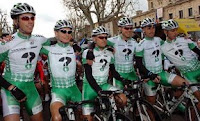The tradition, the sentimentality, the undevoted fan loyalty, and the responsibility to the riders Armstrong once battled with, wasn't enough to sway the decision in favor of staying in the game, despite the fact that "...it wasn't about sponsorship."
Rather, the decision hinged on the profitability of investing in a machine that is in need of fixing. "We couldn't in good conscience ask someone to spend the sort of money that it would require to sponsor the team in the current situation. It's not an environment conducive in our opinion to make an investment," said Bill Stapleton, general manager of Tailwind Sports.
 But juxtaposed against the Unibet.com season long saga [which ended with Unibet folding today after being effectively sanctioned against racing any of the big races despite having paid for a Pro Tour license], the inability of governing bodies, race organizers, and an organization of team managers to agree on superflous matters, and the persistent battle to clean up the sport, it is difficult to argue against Tailwind's less than popular decision.
But juxtaposed against the Unibet.com season long saga [which ended with Unibet folding today after being effectively sanctioned against racing any of the big races despite having paid for a Pro Tour license], the inability of governing bodies, race organizers, and an organization of team managers to agree on superflous matters, and the persistent battle to clean up the sport, it is difficult to argue against Tailwind's less than popular decision.In the United States, civil engineers have long recognized the need to address the crumbling infrastructure of our cities. Perhaps Discovery Channel's departure can be likened to the Minneapolis Bridge collapse; the ultimate signal to cycling's governing bodies like the UCI, AIGCP, ASO, IPCT, etc., that the infrastructure is in dire need of fixing.

No comments:
Post a Comment